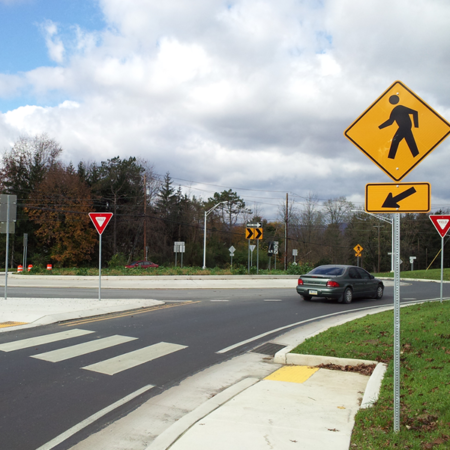Transit Planning
- Home
- /
- Departments
- /
- Transportation Planning
- /
- Transit Planning
Transit Planning
In carrying out its designated role in planning and programming transportation projects, the SEDA-COG Metropolitan Planning Organization (MPO) has long championed and supported public transportation by offering technical assistance, approving transit funds for needs such as vehicle purchases, adding a transit representative as a voting member of the MPO, participating on study work groups, and more. Legislative requirements and guidance issued by the Federal Transit Administration and Pennsylvania Department of Transportation have served to strengthen the SEDA-COG MPO’s role as a coordinator and facilitator for addressing public transit and human services transportation issues. Certain federal grant programs require that projects selected for public transportation funding be “included in a locally developed, coordinated public transit-human services transportation plan” and that the plan be “developed through a process that includes participation by seniors, individuals with disabilities, representatives of public, private, and non-profit transportation and human services providers and other members of the public.”
Coordinated Public Transit-Human Services Transportation Plan
The Coordinated Public Transit-Human Services Transportation Plan (Coordinated Transit Plan) recommends how existing public transit service providers and human service agencies offering transportation services can better meet the transportation needs of people accessing or receiving human services. This population includes low-income individuals, seniors, minorities, and persons with disabilities and/or limited English language skills.
The current Coordinated Transit Plan for the SEDA-COG and Williamsport Area Metropolitan Planning Organizations was adopted in 2019. This plan will be reevaluated on a regular basis to meet the evolving needs of the region, but is generally updated every 5 years. The Coordinated Plan will be consistent with the region’s regular short-term and long-term transportation planning processes for maximum integration and effectiveness.



- Transportation Planning
- SEDA-COG Metropolitan Planning Organization
- SEDA-COG Long Range Transportation Plan
- Transportation Alternatives Program
- Transportation Improvement Program
- Middle Susquehanna Regional Bike-Ped Plan
- Public Participation Plan
- Region Gas Utilization Initiative
- Local Technical Assistance Program
- Transit Planning
- Transportation Comments
- Document Translation Request
Transit Links
Providers
- Call A Ride Service (CARS) – Mifflin/Juniata Counties
- Columbia County Shared Ride – rabbittransit administers
- FindMyRidePA
- Fullington Trailways
- Lower Anthracite Transit System (LATS) – Mount Carmel Borough Administers
- Montour County Shared Ride – rabbittransit administers
- Northumberland County Shared Ride – rabbittransit administers
- Rohrer Bus Service
- STEP, Inc. – Clinton/Lycoming Counties
- Union-Snyder Community Action Agency
- Union/Snyder County Shared Ride – rabbittransit administers
- Amtrak
- Centre Area Transportation Authority (CATA)
- River Valley Transit Authority – Lycoming County
State Government
- PennDOT Bureau of Public Transportation
- Pennsylvania Area Agencies on Aging
- Pennsylvania Human Services Directory
Federal Government
Associations
Central PA Transportation Coalition
The Central Pennsylvania Transportation Coalition (CPTC) consists of numerous public and private sector human service and transportation-related organizations in the central Pennsylvania region. Our primary service area includes Columbia, Lycoming, Montour, Northumberland, Snyder, and Union Counties; our secondary service area includes Centre, Clinton, Juniata, and Mifflin Counties.
Our mission is:
To advocate for meeting the regional needs for transportation so that area residents have alternative, accessible, efficient, and affordable means of travel.
The CPTC replaced the former North Central Pennsylvania Public Transportation Taskforce (2009-2017). The SEDA-COG Metropolitan Planning Organization (MPO) is an active member of the Coalition, which meets on a quarterly basis.
North Central PA Regional Public Transportation Needs Assessment
Gannett Fleming was engaged to complete the needs assessment and report findings to decision-makers and residents in the region.
This document represents the final report of the North Central Regional Public Transportation Needs Assessment. The final report is organized based on the order of the interim reports that were submitted to the North Central Pennsylvania Public Transportation Taskforce (NCPPTT) and SEDA-COG during the planning study.
This Community Characteristics Report presents the demographic, land use, economic and travel patterns and conditions that will be used in conjunction with stakeholder input to assess the potential demand for public transportation services in the study area (Columbia, Lycoming, Montour, Northumberland, Snyder, and Union counties). These characteristics provide the background information to determine the applicability of various types of alternative transportation service in the region.
The goal of this Existing Transportation Services Report is to provide an overview of the local public transportation services and human service transportation programs available in North Central Pennsylvania, as well as other private transportation services – intercity bus and taxis – that are critical to ensuring mobility for transit dependent population groups, such as senior citizens, persons with disabilities and low income individuals.
The purpose of the Potential Transit Needs Analysis Report is to document the results of an analysis of transit demand for the study area.
The purpose of this Alternative Service Improvement Strategies discussion paper is to provide a wide range of alternatives, at the concept level, for consideration and prioritization by the needs assessment task force. It is important to focus available resources on the alternatives that are viewed as having the best chance of (a) addressing the highest priority needs, (b) gaining the support of key stakeholders and policymakers, and (c) being implemented.
Focus Group Sessions:
Members of the public were invited to voice their opinions about the region’s public transportation needs at four focus group sessions, which began on November 9, 2010. The focus groups were part of a comprehensive study looking at transportation needs in Columbia, Lycoming, Montour, Northumberland, Snyder, and Union counties. Anyone residing or working within the six counties, with an interest in providing input, was encouraged to attend one of the focus groups.
Regional Transit Plan Resources:
